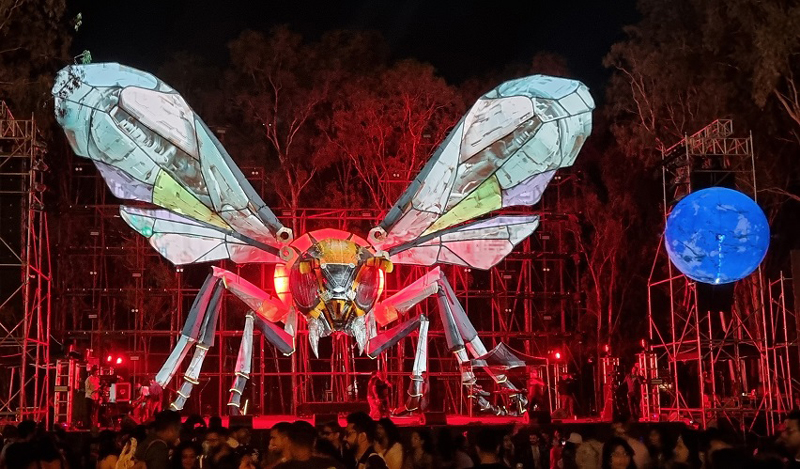(headline image: Echoes of Earth festival 2024, Greater One-Horned Stage)
Bands from Australia, Austria, Canada, Egypt, France, India, Netherlands, UK, and US performed recently at the seventh edition of Echoes of Earth in Bangalore, positioned as ‘India’s greenest festival.’
The 2024 edition was themed Symphony of Seasons, celebrating the seasons, nature’s resilience, and the varying moods which were reflected in the stage designs and art installations. See our writeups on the earlier Bengaluru and Goa editions of the two-day festivals.
Along with music acts, 30 art installations promoting environmental awareness and nature conservation took center stage at the festival, as show in this photo essay. Some of the artworks were even created from a crowdsourced e-waste collection drive conducted before the festival.






There were educational displays and booths such as a fungi museum, insect lab, plant chronicles, and bio-sonic explorations – as well as workshops on dance, flow and blockprinting.






“For me, Echoes of Earth is a reaffirmation of the power of community. Every small step – from clean energy like biogas powering food courts to zero-waste initiatives – reflects our commitment and goes a long way,” Roshan Netalkar, Festival Director of Echoes of Earth and Managing Director at Swordfish Events & Entertainment, tells World Music Central.
“This is more than a festival; it is a step in our ongoing journey of evolution and care for the world we live in. The response has been incredibly moving, inspiring us all to do better,” he gratefully acknowledges.

Artists like the Ghatam Udupa Collective showcased a blend of Carnatic music percussion, vocals, and dance.

Other groups combined electronic sounds with folk influences, such as DJ Hamza Rahimtula with Rajasthan Folkstars.

“I feel complete freedom at Echoes of Earth to be myself and also to not play safe, so that’s what excites me. I can take chances and calculated risks. I am just grateful to have this opportunity and I gave it my 100%,” Rahimtula enthuses.
The performers also comment on the key role that art plays in our increasingly troubled world. “It is critical that artists reflect the realities of the countries, societies, and cultures they live in, and do so through free, creative expression and kinship with other artists in their community,” the Excise Department contemporary music collective affirms.
“Sometimes, one has to shout, complain and speak truth to power, no matter how beautiful or ugly things might get,” they add.
Musicians face challenges in the face of powerful influences and the lure of easy money. “We try very hard to avoid falling prey to this, and we do so by creating art which is honest, authentic, and irreverent. If we can stay true to our values, we have succeeded,” they emphasize.

“Some artists do comment on the political or social climate of the day, while other artists do not. Some write about the state of the world with great expertise, and some look inward and create art about deeply personal stories. Both are valid, both are necessary, and both are deeply intertwined,” explains artist Shubh Sharan, who blends modern jazz, Indian classical music, and progressive rock.
He defines artistic success in terms of authenticity and longevity. “A successful music career for me is firstly, if I can create music with authenticity and artistic integrity. And secondly, to be able to do it with longevity in a way that is sustainable,” he adds.
“I would call myself successful if I can look back at a long music career full of ups and downs, being satisfied in knowing that I made exactly the kind of music I wanted to in a way that I thought was best,” Sharan says.

The use of technologies like GenAI is impacting creative industries around the world, throwing up opportunities as well as challenges. “We can use AI to extract any sound we want from anywhere and we can reuse that sound in another context. For me, this is crazy, and it opens up so many opportunities! It’s super exciting,” Rahimtula observes.
Many of the performers offer tips for aspiring musicians as well. This can involve formal music education as well as going beyond it.
“Extra learning needs to come from the music students themselves – the confidence to take risks in trying many different styles, immersing yourself in as many different musical environments as you can to simulate life outside of music school,” Shubh Sharan advises.
Leaving school is always a learning curve. “But if you spend time figuring out who you are while in a music school environment, that leap feels less difficult once you leave,” he adds.
“Be yourself, make the music you love, with people you care about, and give it time. Progress is never linear, and careers are never one directional. Be ready to pivot and change in service of a larger dream,” Sharan advises.

Tarun Nayar of Modern Biology cautions that the fun and feeling elements of music often get left out in favor of rote learning and intellectualization. “Chops are important, but so is feeling. Most of the musicians I know making a living from their art never went to school,” he observes.


“Keep at it and don’t give up. Ups and down happen, but consistency is the name of the game. As long as you keep learning, you will keep improving and growing,” Rahimtula suggests.
“The minute you think you know it all is when you go down! Be humble and be a student for life,” Rahimtula signs off.
(All photographs were taken by Madanmohan Rao on location at the festival.)


